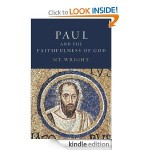Qualifications of an important thesis are always crucial. At the end of his robust defense of his exile thesis we get some of these and they are worth noting. First it should be noted that Tom is arguing that Deut. 27-30 combined with Dan. 7-9 (especially 9), set up a narrative pattern which affected many early Jews in the way they thought about their past, present and future. Many, but not all, by any means. On p. 158, in a parenthetical comment Tom says this— “my case is not that all Jews throughout the period understood themselves to be living in a state of ‘continuing exile’ only that such an understanding was widespread, and was particularly likely to be true of zealous Pharisees” [i.e. Pharisees of the ilk of Saul of Tarsus]. Tom grants that a series of early Jewish texts are exceptions to what he calls ‘the basic pattern’ or the ‘controlling metaphor’ of exile, including Sirach, some of the Maccabean material. In response to Seifrid’s critique of his theory, Tom makes the following further qualifications (p. 160 n.335): 1) he grants that there are a variety of positions taken on this issue during the period; 2) the narrative locations of the texts in question vary widely. This he also grants. It is worth pointing out that it was perfectly possible for an early Jew to believe that the exile had long been over, but the full restoration had not yet happened. There had been some foreshadowings, and foretastes of it during the Maccabean period. Would these Jews have seen this as a false dawn as Tom repeatedly calls it, a mere premonition and not a foretaste? I think this is more than doubtful. It is probably just wrong. What exactly would they have been celebrating at Hanukkah with all the waving of the palm branches if they thought the Maccabean revolt was a false dawn, an exercise in futility? Just because the Maccabees were not the Messiahs, doesn’t mean they would not be seen as a partial fulfillment of God’s promises to his people, including the ones in Deut. 27-30, indeed they surely were seen as a sign that God had not abandoned his people to yet another exile, which explains why so many early Jews were named after these war heroes. At the same time they recognized that the full restoration was yet to come, when Messiah, resurrection etc. happened as Daniel suggested. Tobit, 2 Baruch, Testament Naphtali speak of what Tom calls a respite in the larger overall bleak and dire situation. This may give these texts too little credit. In other words, they don’t seem likely to fall into the category of people who viewed the respite as illusory or a false dawn. And here is where I say that the issue then becomes— what is the dominate view? Is it the basic pattern as Tom sees it, which allows him to call what was happening in Israel in Jesus’ day still an exile of sorts? It seems to me that the most he can demonstrate is that he has established an important pattern, but there is no way to know if it is the basic or dominant one. The evidence against such a strong conclusion is as substantial as the evidence for this. The most one can say on the basis of hard evidence is that some zealots, including some zealous Pharisees likely thought this way. It is not at all clear that Jesus agreed with them. Indeed, I think it is safe to say that Jesus would have had strong disagreements with Saul of Tarsus before be became a follower of the man from Nazareth. And last, but not least, not being in exile is one thing, experiencing full restoration is another. The fact that many Jews did not see themselves as still in exile, and so not in the worst possible state, doesn’t mean they saw themselves as already fully experiencing God’s highest and best for his people. Restoration is the beginning of positive things. The end of exile is the end of negative ones. These two things can be distinguished.
I think Tom has now made as strong a case as he can that some early Jews saw themselves as still suffering lingering effects of exile. That this is the dominant or controlling pattern or metaphor of early Jewish literature of the second temple period he has not established. We must examine in the next post what he says about restoration.














